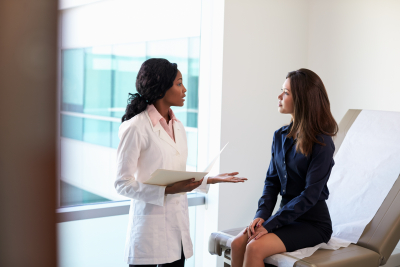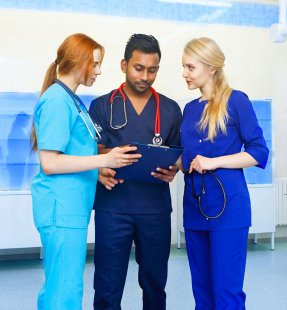
A Medical assistant should possess the comprehensive knowledge of moral values and disciplines of the medical field. He/she should employ them while coping with doctors, medical staff and patients. In general, medical assistant students will learn about the arrangement, construction, make-up, roles and functioning of the major human body network and systems in tandem with the vital medical terms and expressions. The medical assisting course will furnish students with a methodical foreword to infection preventing procedures and medical guiding principles in addition to several safety methods.
Medical assisting students will become skilled at fundamental ideologies for interrogating a patient and in receiving his/her health history in order to present all details to the doctor in order to provide further treatment. Students will also learn about the vital therapeutic & diagnostic procedures, imperative computer expertise, directorial or administrative processes, office, finance and secretarial concepts. Different ways to process medical insurance bills, claims and forms of the patients will also be introduced to the students.
Students will learn about performing and executing medical procedures such as recording important health symptoms and signs of patients, carrying out habitual medical office & lab procedures, helping patients prepare for physical examinations and assist the doctor with all health examinations. An introduction to the basic preparation and methods for assisting physicians with in-office surgical procedures performing crucial procedures in the sanitizing of medical tools and equipment, sterilization and disinfecting process will be introduced.
Medical assistants will be trained to demonstrate aseptic hand cleaning, recording patient body weight and height measurement and the appropriate positioning and draping of patients for a range of health examinations and specialty health assessments in the following areas:
- Physical treatment
- Pelvic and pap smear procedures
- Crucial pregnancy examinations for women
- Ear and eye procedures
- Taking electrocardiogram
- Performing venipuncture
What do you need to register?
You must be at least 17 years of age to register but You must be 18 years old to sit for the National Exam .
You will need to bring your State or Military ID, Social Security card,
High School diploma and or GED
The 6th week of class We need a Current COUNTY background check, Tuberculin Test (TB test) and min 5 panel employment drug screen that will be done in class with your classmates the day before final exam.
Monday and Wednesday or Tuesday and Thursday
from 10:00 a.m. to 2:00 p.m. for 15 weeks or 6 pm – 10 pm
15 weeks of classroom/lab and 50 hours of clinical rotation
Payment Options
ALL CLASSES HAVE A non-refundable application fee of $50.00
Option A – Pay the FULL tuition cost of $2,950.00
Option B- Pay A $350.00 Deposit and 14 weekly payments of 189.00 included is the one time $50.00 payment arrangement fee
The cost of the National Exam due the last day of class.
What to Wear
Our uniform for this course is black scrub top and black scrub bottom, with any kind of closed toed shoes.
What to bring
You will need the Textbook ” Today’s Medical Assistant 3rd edition” The link below will take you to the textbook to purchase
You will need a stethoscope and blood pressure cuff by the 2nd week of class, below is the link for a blood pressure cuff and stethoscope
We offer AHA BLS to all our students, this must be completed and in file before completion
Bring a notebook and a pen to class daily.
Upon successful completion of all required classroom and laboratory training, the student will be eligible for externship training where more hands-on skills competency will be attained. A negative PPD skin test within six months or a negative chest x-ray within 5 years will be required. Upon completion, graduates are awarded a certificate of completion and eligible to sit for a National Certification. Classes are conducted with 10-14 students in a class.





